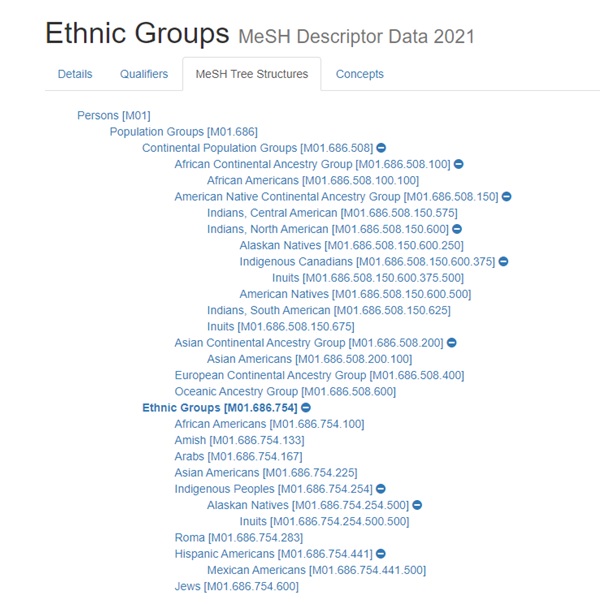Over the last year, many stakeholders involved in scholarly publishing have been revisiting the terminology used for reporting race and ethnicity in biomedical literature, for example:
Flanagin A, Frey T, Christiansen SL; AMA Manual of Style Committee. Updated Guidance on the Reporting of Race and Ethnicity in Medical and Science Journals. JAMA. 2021 Aug 17;326(7):621-627.
Flanagin A, Frey T, Christiansen SL, Bauchner H. The Reporting of Race and Ethnicity in Medical and Science Journals: Comments Invited. JAMA. 2021 Mar 16;325(11):1049-1052.
In 2022, the National Library of Medicine, producer of PubMed/MEDLINE, also made changes to the Medical Subject Headings (MeSH) related to race and ethnicity, replacing multiple headings with more up-to-date terminology that better matches with the latest United States Census terminology. Among the 24 changes to MeSH headings this year were:
African Continental Ancestry Group >>>> Blacks
American Natives >>>> American Indians or Alaska Natives
Asian Continental Ancestry Group >>>> Asians
Continental Population Groups >>>> Racial Groups
Ethnic Groups >>>> Ethnicity
European Continental Ancestry Group >>>> Whites
Hispanic Americans >>>> Hispanic or Latino
Oceanic Ancestry Group >>>> Native Hawaiian or Other Pacific Islander
Below is a more detailed view of how the MeSH Tree Structures were affected by the changes. To compare, here is the Population Groups Tree from MeSH 2021: 2022 MeSH replacements:
2022 MeSH replacements:
“Ethnicity”[Mesh]
A group of people with a common cultural heritage that sets them apart from others in a variety of social relationships.
“Racial Groups”[Mesh]
Groups of individuals with similar physical appearances often reinforced by cultural, social and/or linguistic similarities.
2022 MeSH additions: (to MeSH trees other than “Population Groups”)
“Health Disparity, Minority and Vulnerable Populations”[Mesh]
Groups of persons whose special characteristics make them a minority, vulnerable, and frequently subjected to conditions with limited levels of access to health care and other opportunities. (Most of the 2021 “Ethnic Groups” MeSH tree terms were moved here.) 
“Ethnic and Racial Minorities”[Mesh]
Socially constructed groups of people who differ in race, color or national, religious, or cultural origin from the dominant group and is often the majority population of the country in which they live. Ethnic minority groups generally share a common sense of identity and common characteristics such as language, religion, tribe, nationality, race, or a combination thereof.
The MeSH vocabulary is reviewed annually and revised on an “as needed” basis to best represent the latest subject matter appearing in the biomedical literature. It is not perfect and always a work in progress that grows and changes organically. Everyone is welcome to write to the NLM help desk to submit a request for a change or addition to the MeSH vocabulary.
Questions? Ask Us at the MSK Library.
 MSK Library has subscribed to a new multidisciplinary eJournal,
MSK Library has subscribed to a new multidisciplinary eJournal, 